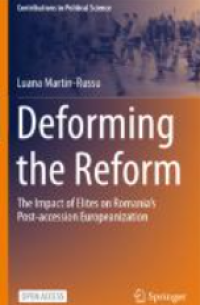
Text
E-book Deforming the Reform : The Impact of Elites on Romania’s Post-accession Europeanization
Penilaian
0,0
dari 5On 1 January 2007, Romania became a full member of the European Union. Thestatethat joined the EU was already since 1991 a constitutional republic with abicameral Parliament elected by popular vote and with a dual executive formed by adirectly elected president and an appointed prime minister. In the lead-up to itsaccession, Romania had to amend and adopt numerous laws in order to bring theminto line with the EU’s basic requirements for its member states. The body respon-sible for overseeing the constitutionality of these laws was the Romanian Constitu-tional Court, an extra-judiciary body with judges appointed by the president andeach of the two parliamentary chambers, tasked with reviewing acts adopted bylawmakers and often arbitrating disputes that failed to be negotiated politically.Romania’s basic law provides guarantees of political pluralism, of checks andbalances in the political system, and of a clear separation of powers, with itsrepresentative authorities constitutionally required to act in the public interest.However, post-accession, it became clear that in certain areas, laws that had beenimplemented in order to meet EU standards were being undermined or reversed by aself-serving political elite.Thepeoplethat became EU citizens in January 2007 enjoyed long beforeaccession the right to vote for their representatives, with fair, free, competitive andreasonably well organized elections being held every 5 years for president and every4 years for the Parliament. However, electing representatives does not always meanhaving their interests represented. Indeed, since then, there has been an increasinglylow level of public trust in political representatives, which stems mainly from a lackof appropriate governance. Rather than losing hope though, in the last 15 yearscitizens started to take matters into their own hands, with civil society organizationstaking up the role of policy implementers. For example, independent media wassaved by the engagement and dedication of journalists who attracted donations in support of independent outlets; a non-governmental organization (D?ruie?te Via??)raised funds for building, without state help, a much needed children’s hospital,which turned out to be the best equipped hospital in the country until now; anothernon-governmental organization (Code for Romania) offered its services pro bono tothe government, deploying in the shortest time an entire digital ecosystem to informand support citizens affected by the COVID-19 pandemic; and more recently a greatnumber of non-governmental organizations and volunteers mobilized to welcomeand assist the more than half a million refugees that crossed the borderfleeing thewar in Ukraine. Thepeoplethat became EU citizens in 2007 did exercise their rightto free movement, with more than 20% of the population emigrating to live and workin other member states during the last 15 years. They remained, however, politicallyengaged: they queued for hours to cast their ballot when too small a number ofpolling stations were established across Europe, and in 2018 they returned sponta-neously to Bucharest to stage an unprecedentedly large-scale diaspora protest againstthe government and its failure to curb high-level corruption.
Ketersediaan
Informasi Detail
- Judul Seri
-
-
- No. Panggil
-
320 MAR d
- Penerbit
- Switzerland : Springer Nature., 2022
- Deskripsi Fisik
-
224 hlm
- Bahasa
-
English
- ISBN/ISSN
-
9783031110818
- Klasifikasi
-
320
- Tipe Isi
-
text
- Tipe Media
-
computer
- Tipe Pembawa
-
online resource
- Edisi
-
-
- Subjek
- Info Detail Spesifik
-
-
- Pernyataan Tanggungjawab
-
-
Versi lain/terkait
Tidak tersedia versi lain
Lampiran Berkas
Komentar
Anda harus masuk sebelum memberikan komentar
 Karya Umum
Karya Umum  Filsafat
Filsafat  Agama
Agama  Ilmu-ilmu Sosial
Ilmu-ilmu Sosial  Bahasa
Bahasa  Ilmu-ilmu Murni
Ilmu-ilmu Murni  Ilmu-ilmu Terapan
Ilmu-ilmu Terapan  Kesenian, Hiburan, dan Olahraga
Kesenian, Hiburan, dan Olahraga  Kesusastraan
Kesusastraan  Geografi dan Sejarah
Geografi dan Sejarah